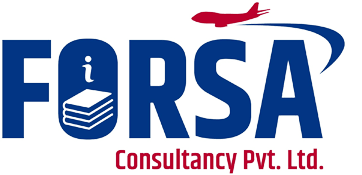Brief Introduction to Work in Canada

Canada is a popular destination for people seeking work opportunities and a better standard of living. The country’s strong economy, diverse job market, and high standard of living make it an attractive option for skilled workers. One popular way for skilled workers to obtain work permits is through the Federal Skilled Worker program, which falls under the Express Entry system. This program is designed to attract highly skilled immigrants who can contribute to the Canadian economy.
Forsa Consultancy is a leading provider of immigration and visa services for those looking to work in Canada. With years of experience in the industry, our team of experts can help guide you through the complex process of obtaining a work permit. We offer a range of services, including assistance with your application, advice on the best pathway for you, and support throughout the entire process.
If you’re interested in working in Canada, the Federal Skilled Worker program is a great option to consider. This program is designed to assess your skills and qualifications, and determine whether you’re a good fit for the Canadian job market. With the help of Forsa Consultancy, you can navigate the application process and increase your chances of success in obtaining a work permit.
Working Lifestyle in Canada
Canada is known for its friendly and welcoming work culture, with a strong emphasis on work-life balance. Canadian companies prioritize their employees’ health and well-being, with many offering flexible working hours and paid time off. This work culture often results in a happier and more productive workforce.
Canadians are generally polite, respectful and helpful, making the workplace a comfortable and inclusive environment for people from different backgrounds. The diversity of Canada’s population also means that companies value a diverse and multicultural workforce, which can be an advantage for international workers.
In terms of career growth, Canada offers many opportunities for employees to advance in their careers, with many companies offering training and development programs. The country also has a strong economy and a thriving job market, which provides many opportunities for both entry-level and experienced professionals.
Overall, working in Canada offers a positive work-life balance, a welcoming and diverse work culture, and ample opportunities for career growth and development.
Types of Work Visa in Canada
There are several types of work visas available in Canada, each with its own requirements and eligibility criteria. The most common work visa types in Canada include:
- Temporary Work Permits: This type of work permit allows foreign nationals to work in Canada for a specified period of time. Temporary Work Permits are issued based on the Labor Market Impact Assessment (LMIA), which is a document that verifies the need for foreign workers to fill job vacancies in Canada.
- International Experience Canada (IEC): This program allows young people from select countries to work and travel in Canada for up to two years. The IEC program has three categories: Working Holiday, Young Professionals, and International Co-op.
- Provincial Nominee Programs (PNP): Each province and territory in Canada has its own PNP, which allows them to nominate foreign workers with the skills and experience required for their labor market. PNP programs are designed to attract foreign workers to specific regions in Canada.
- Express Entry: The Federal Skilled Worker Program is the most popular immigration pathway to Canada. It is a point-based system that assesses the skills, education, language proficiency, and work experience of foreign nationals who want to immigrate to Canada.
Forsa Consultancy provides assistance and guidance for all types of work visa applications. Their team of experts can help individuals understand the requirements and eligibility criteria for each type of visa, and provide support throughout the application process.
Required Documents for Work Visa in Canada
The required documents and eligibility for a working visa in Canada can vary depending on the type of visa being applied for. However, there are some general requirements that must be met for most types of work visas.
Firstly, applicants must have a valid job offer from a Canadian employer. The job offer must be in a skilled occupation that is listed on the National Occupational Classification (NOC) system. The employer must also obtain a Labour Market Impact Assessment (LMIA) from Employment and Social Development Canada (ESDC), which demonstrates that there are no Canadian citizens or permanent residents available to fill the job.
Secondly, applicants must meet the language requirements for the visa they are applying for. For most work visas, applicants must prove their proficiency in English or French. This is typically done by taking a language test such as the International English Language Testing System (IELTS) or the Test d’évaluation de français (TEF).
Thirdly, applicants must provide evidence of their qualifications and work experience. This may include educational certificates, professional licenses, and reference letters from previous employers.
Finally, applicants must meet the health and character requirements for the visa they are applying for. This may involve undergoing a medical exam and obtaining a police certificate from their home country.
At Forsa Consultancy, we can provide guidance and support throughout the visa application process, including helping applicants to gather and submit all necessary documents. Our experienced team can also assist with language testing and other requirements to ensure that applicants have the best chance of success in their visa application.
Cost of Living and Taxes in Canada
Canada has a relatively high standard of living, and the cost of living can vary depending on the province or city you reside in. Generally, larger cities like Toronto and Vancouver have a higher cost of living than smaller cities or rural areas. Housing is one of the most significant expenses, and renting a one-bedroom apartment can cost around CAD 1,500-2,000 per month in the larger cities. Food, transportation, and other expenses are also relatively high compared to other countries.
Canada’s tax system is progressive, meaning that the more you earn, the more you pay in taxes. The federal government levies income tax, and each province and territory also has its own tax system. The tax rates vary depending on your income level, with the highest federal tax rate currently at 33%. In addition to income tax, Canadians also pay other taxes such as the Goods and Services Tax (GST), which is a value-added tax on goods and services. The combined tax rate can be relatively high, but it is important to note that Canadians also benefit from a range of public services, such as universal healthcare and education.
Trainings available to Work in Canada
Forsa Consultancy offers a range of training programs to help individuals prepare for work in Canada. One of the most important aspects of settling in Canada is the ability to communicate effectively in English or French. Our language training programs are designed to help students achieve the required proficiency levels in English and French, as measured by the Canadian Language Benchmarks (CLB) for English and the Niveaux de compétence linguistique canadiens (NCLC) for French. We also provide IELTS and CELPIP preparation courses to help students achieve the necessary language scores required for their immigration or work permit applications.
In addition to language training, we offer skill-specific training programs that are tailored to meet the requirements of various industries and occupations in Canada. These programs include training in fields such as healthcare, hospitality, agriculture, construction, and more. Our experienced trainers provide hands-on training and guidance, enabling individuals to develop the skills needed to excel in their chosen fields and meet the demands of the Canadian job market.
At Forsa Consultancy, we understand the challenges that individuals may face when navigating the Canadian job market. Our training programs are designed to help individuals overcome these challenges and prepare them for success in their chosen careers. We provide comprehensive support to our students, including job search assistance, resume writing workshops, interview preparation, and more. Our goal is to help individuals achieve their career aspirations and contribute to the vibrant and diverse workforce of Canada.
